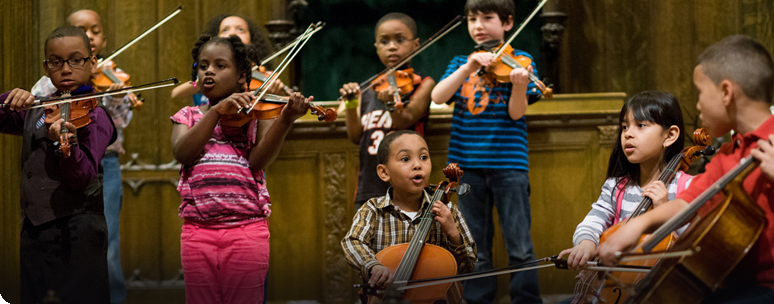I love making music with Community MusicWorks. This weekend, I had the privilege of playing in the all-Bach concert at the John Carter Brown Library in Providence. We played Brandenburg concertos and other great pieces that really move people.
Rehearsal: Tim Macri was the flute soloist in Brandenburg No. 5 and the Polonaise and Badinerie from the B Minor Orchestral Suite.
The music was fantastic, but the people involved really brought it to life. Whether it was Fred making the audience roar in laughter about Bach’s letters; Chloe making her viola shine; Minna playing a beautiful cadenza; Sebastian adding color with his fun pink striped shirt [see below]; or Liz creating a wonderful meal for the musicians, each person helped to create an incredible experience for the audience and musicians alike.
 Fred and Sebastian unwind after the concert.
Fred and Sebastian unwind after the concert.
The location was perfect–a beautiful library with tall ceilings and lots of fancy woodwork. A room surrounded by great books, with huge paintings and tapestries decorating the walls.
The audience was varied–retired folks, CMW families, CMW board members, friends, and many others. My favorite audience member was the little guy [a CMW sibling] in the front row who succumbed to sleepiness about halfway through the concert.
At intermission, I ventured out into the audience and was stopped several times by audience members expressing their appreciation and enthusiasm. They wanted to know about what was behind this incredible concert, and it gave me an opportunity to tell them about the amazing way CMW engages and involves the community.
 Longy ladies (l-r): Sarah, Rachel, Arlyn (now a CMW Fellow)
Longy ladies (l-r): Sarah, Rachel, Arlyn (now a CMW Fellow)
What strikes me most about all of my experiences with CMW is the all-pervasive spirit of inclusiveness I sense whenever I am around CMW folks. They are a humble and fun group of musicians who genuinely desires to make life better for everyone else.
Thank you, Community MusicWorks!
-Sarah Glenn, violin


